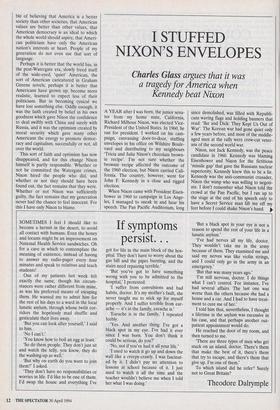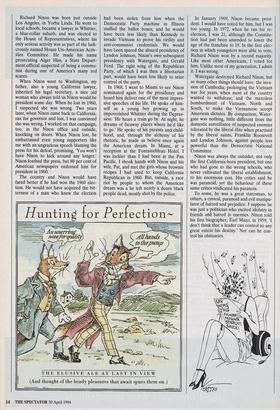I STUFFED NIXON'S ENVELOPES
Charles Glass argues that it was a tragedy for America when Kennedy beat Nixon A YEAR after I was born, the junior sena- tor from my home state, California, Richard Milhous Nixon, was elected Vice- President of the United States. In 1960, he ran for president. I worked on his cam- paign, canvassing door-to-door, stuffing envelopes in his office on Wilshire Boule- vard and distributing to my neighbours 'Tricia and Julie Nixon's chocolate brown- ie recipe'. I'm not sure whether the brownie recipe affected the outcome of the 1960 election, but Nixon carried Cali- fornia. The country, however, went for John F. Kennedy in a close and rigged election.
When Nixon came with President Eisen- hower in 1960 to campaign in Los Ange- les, I managed to sneak in and hear his speech. The Pan Pacific Auditorium, long since demolished, was filled with Republi- cans waving flags and holding banners that read: 'Ike and Dick: They Kept Us Out of War'. The Korean war had gone quiet only a few years before, and most of the middle- aged men at the rally were crew-cut veter- ans of the second world war.
Nixon, not Jack Kennedy, was the peace candidate in 1960. Kennedy was blaming Eisenhower and Nixon for the fictitious 'missile gap' that gave the Russians nuclear superiority; Kennedy knew this to be a lie. Kennedy was the anti-communist crusader, Nixon the wimp who was willing to negoti- ate. I don't remember what Nixon told the crowd at the Pan Pacific, but I ran up to the stage at the end of his speech only to have a Secret Service man lift me off my feet before I could shake Nixon's hand. Richard Nixon was born just outside Los Angeles, in Yorba Linda. He went to local schools, became a lawyer in Whittier, a blue-collar suburb, and was elected to the House of Representatives, where his only serious activity was as part of the ludi- crously named House Un-American Activ- ities Committee. He made his name prosecuting Alger Hiss, a State Depart- ment official suspected of being a commu- nist during one of America's many red scares.
When Nixon went to Washington, my father, also a young California lawyer, inherited his legal secretary, a nice old woman who always told us Nixon would be president some day. When he lost in 1960, I suspected she was wrong. Two years later, when Nixon came back to California, ran for governor and lost, I was convinced she was wrong. I worked on that campaign, too, in the Nixon office and outside, knocking on doors. When Nixon lost, he embarrassed even young supporters like me with an ungracious speech blaming the press for his defeat, promising, 'You won't have Nixon to kick around any longer.' Nixon loathed the press, but 80 per cent of American newspapers endorsed him for president in 1960.
The country and Nixon would have fared better if he had won the 1960 elec- tion. He would not have acquired the bit- terness of a man who knew the election had been stolen from him when the Democratic Party machine in Illinois stuffed the ballot boxes; and he would have been less likely than Kennedy to invade Vietnam to prove his virility and anti-communist credentials. We would have been spared the absurd presidency of Lyndon Johnson, Nixon's own subsequent presidency with Watergate, and Gerald Ford. The right wing of the Republican Party, of which I was then a libertarian part, would have been less likely to seize control of the party.
In 1968, I went to Miami to see Nixon nominated again for the presidency and heard him deliver one of the most impres- sive speeches of his life. He spoke of him- self as a young boy growing up in impoverished Whittier during the Depres- sion: 'He hears a train go by. At night, he dreams of faraway places where he'd like to go.' He spoke of his parents and child- hood, and, through the alchemy of his rhetoric, he made us believe once again the American dream. In Miami, at a reception at the Fontainebleau Hotel, I was luckier than I had been at the Pan Pacific. I shook hands with Nixon and his wife, Pat, and met the girls whose brownie recipes I had used to keep California Republican in 1960. But, outside, a race riot by people to whom the American dream was a lie left nearly a dozen black people dead, mostly shot by the police. In January 1969, Nixon became presi- dent. I would have voted for him, but I was too young. In 1972, when he ran for re- election, I was 21, although the Constitu- tion had just been amended to lower the age of the franchise to 18. In the first elec- tion in which youngsters were able to vote, Richard Nixon won by a record majority. Like most other Americans, I voted for him. Unlike most of my generation, I admit it. I was wrong.
Watergate destroyed Richard Nixon, but so many other things should have: the inva- sion of Cambodia; prolonging the Vietnam war for years, when most of the country wanted to withdraw; and the merciless bombardment of Vietnam, North and South, to make the Vietnamese accept American dictates. By comparison, Water- gate was nothing, little different from the domestic surveillance of suspected enemies tolerated by the liberal elite when practised by the liberal saints, Franklin Roosevelt and Lyndon Johnson, against people less powerful than the Democratic National Committee.
Nixon was always the outsider, not only the first California-born president, but one who had gone to the wrong schools, who never cultivated the liberal establishment, to his enormous cost. His critics said he was paranoid, yet the behaviour of these same critics vindicated his paranoia.
To some, he was a great statesman, to others, a cynical, paranoid and evil manipu- lator of hatred and prejudice. I suppose he was just a politician who excited idolatry in friends and hatred in enemies. Nixon told his first biographer, Earl Mazo, in 1959, 'I don't think that a leader can control to any great extent his destiny.' Nor can he con- trol his obituaries.



























































 Previous page
Previous page